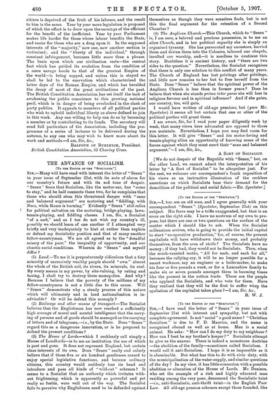THE ADVANCE OF SOCIALISM.
rTo THE EDITOR OP THE "SPECTATOR.'] SIR,—Many will have read with interest the letter of "Senex" in your issue of September 21st, with its note of alarm for our country's future and with its sad tone of despair. " Senex " fears that Socialism, like the motor-car, has "come to stay," and he half connects these two, for he complains that those who should stem this threatened danger with " sane and balanced argument" are motoring and "fiddling, with Nero, while Rome is burning." Evidently "Senex " still relies for political salvation on the motoring, bridge-playing, lawn- tennis-playing, and fiddling classes. I am, Sir, a Socialist "of a sort," and as I too do not wish my country's ill, possibly we should learn of one another if I attempted very briefly and very inadequately to hint at rather than explain or defend my Socialistic position and that of many another fellow-countryman. We are all agreed as to the "dreadful misery of the poor," the inequality of opportunity, and our chaotic social conditions. Wherein do " Senex" and myself differ ?
(1) Land.—To me it is preposterously ridiculous that a tiny minority of excessively wealthy people should "own" almost the whole of the British soil, its rivers, its minerals, its coal. By every means in my power, by site-valuing, by rating and taxing, I shall try to destroy these monopolies. And why ? Because I believe that the poverty of the millions of my fellow-countrymen is not a little due to this cause. Will " Senex" demonstrate why a steady process of this nature which will ultimately end in land nationalisation is in- advisable ? Or will he defend this monoply F (2) _Railways and other means of transport.—The Socialist believes that the Englishman has now reached a sufficiently high average of moral and mental intelligence that the carry- ing of persons and of goods should be managed as the carrying of letters and of telegrams,—i.e., by the State. Does " Senex " regard this as a dangerous innovation, or is he prepared to defend the present conditions ?
(3) The House of Lords—which I recklessly call simply a House of Landlords—is to me an institution the use of which is past and gone. It does not represent England, but certain class interests of its own. Does "Senex" really and calmly believe that if those five or six hundred gentlemen ceased to enjoy special legislative functions, and became ordinary citizens, this country would suddenly lose its head and introduce and pass all kinds of " wild-cat " schemes ? It seems to a Socialist that an authority which irritates with- out frightening, which is apparently so powerful and yet really so feeble, were well out of the way. The Socialist fails to perceive why Englishmen need to be defended against
themselves as though they were senseless fools, but is not this the final argument for the retention of a Second Chamber ?
(4) The Anglican Church.—This Church, which•to " Senex " is, I am sure, a beloved and precious possession, is to me an alien Church, and in her political capacity she is simply an organised tyranny. She has persecuted my ancestors, harried them and driven them into the Colonies, tabooed our chapels, insulted our worship, and—it is needless to continue this story. Doubtless it is ancient history, and " there are two sides to the question." Nevertheless, the Socialist recognises that there is only one solution to this conflict of many years. The Church of England has lost privilege after privilege, and little now remains to her but to free herself from the State. Does "Senex " believe that the spiritual power of the Anglican Church is less than in former years ? Does be believe that when she stands prima inter pares she will lose in religious fervour and in spiritual influence? And if she gains, our country, too, will gain.
I would have written of old-age pensions, but (pace Mr. Spectator) it seems all but certain that one or other of the political parties will grant these.
I am aware, Sir, for I read your paper diligently week by week, that many views here advocated are opposed to those you maintain. Nevertheless, I hope you may find room for this letter. It will give "Senex" and his motor-loving and tennis-playing allies an opportunity of knowing some of the forces against which they must exert their "sane and balanced argument."—I am, Sir, &c.,
A SORT OF SOCIALIST.
[We do not despair of the Republic with "Senex," but, on the other hand, we cannot admit the interpretation of his letter by "A Sort of Socialist" to be altogether just. For the rest, we welcome our correspondent's frank exposition of his views as an instructive illustration of the reckless assertions on which Socialists base their demand for the demolition of the political and social fabric.—ED. Spectator.]






























































 Previous page
Previous page